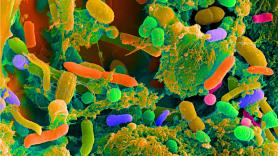4. Gut-brain axis
Preclinical studies published in the past decade clearly established the important role intestinal microbiota plays in the behavior and regulation of key components of the gut-brain axis, including brain function and structure.
Emeran A. Mayer, professor at the University of California, Los Angeles (USA), published with his group the first evidence that an alteration in the gut microbiome of healthy individuals may lead to altered brain response to emotional stimuli.
“The gut-brain axis is a fully integrated system, programed when life begins, in the pre- and post-natal stages. Communication along this axis is regulated throughout a person’s life by diet, medication and stress. Alterations to this communication seem to play a role in regulating various brain disorders, including depression, obesity and irritable bowel syndrome. Imbalances can begin either in the brain or the gut,” he warned.
In his opinion, new treatment strategies for brain disorders will probably include microbiome-related targets and mechanisms, including changes in diet and lifestyle.
Parkinson is another field of interest. As explained Filip Scheperjans, neurologist at Helsinki University Hospital (Finland), so far nine studies have analyzed the composition of the microbiota in patients with this disease, “but the methods and results have varied.”
These studies have shown that, compared to healthy control subjects, Parkinson patients have an abundance of Akkermansia and Lactobacillus and a lack of Prevotella. Bacterial alterations may be tied to the integrity of the mucosa layer of the intestines, production of short-chain fatty acids and immune regulation.
Metagenomic studies that have been conducted point to alterations in numerous pathways, including metabolism of amino acids and production of lipopolysaccharides, among others. Also, lower levels of short-chain fatty acids that supposedly promote good health have been described in patients with Parkinson disease.
The evidence from experiments with mouse models suggests a possible interaction of the intestinal microbiota, alfa-synucleins, short-chain fatty acids, neuroinflammation and motor dysfunction. However, findings associated with short-chain fatty acids were contrary to what was expected in human studies.



